|
|
|
Sort Order |
|
|
|
Items / Page
|
|
|
|
|
|
|
| Srl | Item |
| 1 |
ID:
168565
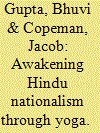

|
|
|
|
|
| Summary/Abstract |
Alongside Prime Minister Narendra Modi, whose politics he explicitly endorses, Swami Ramdev is frequently depicted as the contemporary face of neo-Hindutva nationalism in India. This essay concerns specific, but interrelated, aspects of the Swami Ramdev ‘phenomenon’ and their particular relation to Hindu nationalism. We bracket the headline-stealing anti-Islamic and pro-Modi proclamations in order to focus on the nuances of the relationship between his yoga and a majoritarian Hindutva agenda and examine the specifics of Ramdev’s teachings and campaigns. We suggest that the (Hindu) nationalism of Ramdev and his organisations is formed less of propositional or even affective content but instead is a condition emerging from its particular prescription and practice of yoga; it is a condition of the body. In this way, yoga, as it is reproduced at the site of the individual body, produces the national(ist) activist subject.
|
|
|
|
|
|
|
|
|
|
|
|
|
|
|
|
| 2 |
ID:
142839
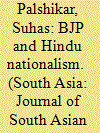

|
|
|
|
|
| Summary/Abstract |
Will the BJP pursue its Hindutva ideology while in power or will it now gradually become a ‘centrist’ party? Responding to this question, the present paper argues that the possibility that it would transform into a centrist party is rather dim for four reasons: 1) the mixing of Hindutva identity with the development agenda during the national election campaign in 2014; 2) the mild and covert pursuit of Hindutva by both party and government; 3) the dynamic, but deep-rooted relationship between Hindutva and the BJP; and 4) most importantly, the slow and imperceptible shifting of the middle ground of public opinion in India in favour of majoritarian (and therefore pro-Hindutva) sentiment.
|
|
|
|
|
|
|
|
|
|
|
|
|
|
|
|
| 3 |
ID:
135575
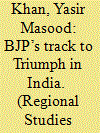

|
|
|
|
|
| Summary/Abstract |
The political landscape of India witnessed a historical about-turn when the Bharatiya Janta Party (BJP) decisively ended the decade-long political monopoly of the Indian National Congress (INC). it goes without saying that the unprecedented victory of the BJP in the recent elections has out-distanced even its own major success of 1998. No doubt, there are a number of crucial factors which paved the way for its resounding success. one of course, is the political and ideological vacuum created by the rival INC. this said, however, this paper seeks to uncover other distinct and multifaceted factors which led to the overwhelming rise of the tide of Hindutva, and this despite the fact that India is touted as being a secular and pluralistic democratic state.
|
|
|
|
|
|
|
|
|
|
|
|
|
|
|
|
| 4 |
ID:
138173
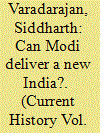

|
|
|
|
|
| Summary/Abstract |
On the surface, Narendra Modi has had a dream run in his first year as India’s prime minister. In May 2014, his Hinduright Bharatiya Janata Party (BJP) won 281 of the 543 seats in the Lok Sabha, the lower house of Parliament. This marked the first time since Rajiv Gandhi’s victory of 1984 that a party won a clear majority of its own and did not need coalition partners to form a government. After this triumph, Modi managed to install his trusted lieutenant, Amit Shah—who ran the interior ministry in Gujarat when Modi was chief minister of the state—as president of the BJP. Together with Shah, he has since gone on to win important state elections in Haryana, Maharashtra, and Jharkhand. In Jammu and Kashmir, the BJP did spectacularly well in the December 2014 elections and is now in government as part of the ruling coalition headed by the Peoples’ Democratic Party.
|
|
|
|
|
|
|
|
|
|
|
|
|
|
|
|
| 5 |
ID:
065124


|
|
|
| 6 |
ID:
079532
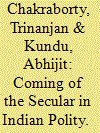

|
|
|
|
|
| Publication |
2007.
|
| Summary/Abstract |
Instead of searching for a definitive connotation of what is 'secular', the present essay explores how secular concepts gradually arrived on the scene of the Indian polity from a variety of areas and re-examines possibilities of probing the place of the secular in Indian polity by problematising its practice over time. Our methodology involves a shift of focus in searching for the roots of this concept in local and peripheral arenas rather than central texts and events. The dynamics of Indian centre-periphery relations have been dominantly historicised by the struggle for independence. This essay highlights the relevance of peripheral texts in defining secular aspects of polity, examining the dominant texts of the centre from the vantage point of the margin. While documenting an alternative discursive construction of secular politics in India, a sociologically informed reading on the question of 'the secular' argues that it will never dominate Indian politics without multiple challenges
|
|
|
|
|
|
|
|
|
|
|
|
|
|
|
|
| 7 |
ID:
101524
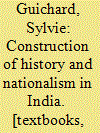

|
|
|
|
|
| Publication |
London, Routledge, 2010.
|
| Description |
xi, 236p.
|
| Series |
Routledge advances in South Asian studies; 17
|
| Standard Number |
9780415565066, hbk
|
|
|
|
|
|
|
|
|
|
|
|
Copies: C:1/I:0,R:0,Q:0
Circulation
| Accession# | Call# | Current Location | Status | Policy | Location |
| 055580 | 954.0072/GUI 055580 | Main | On Shelf | General | |
|
|
|
|
| 8 |
ID:
165236
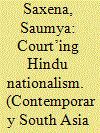

|
|
|
|
|
| Summary/Abstract |
This paper demonstrates the role of the Courts in lending currency to the politics of Hindutva in the 1990s. It focuses on some of the significant and connected cases of the Ayodhya dispute and the infamous Hindutva judgments to illustrate how the court legitimised, perhaps inadvertently, a jingoistic and intolerant ideology as an acceptable political strategy. The rise and electoral successes of the Bharatiya Janata Party (BJP) post-emergency accompanied the party's reliance on the judicial instruments to make its Hindu nationalist ideology palatable to a larger audience and the ‘secular’ citizen. Contrary to the stance of Hindu nationalist organisations against codification of Hindu law and any state interference in matters of religion at the time of independence, in the 1990s the movement relied significantly on judicial instruments for its own legitimacy and for expanding the domain of religion by seeking the patronage of ‘law’. The Court, in what came to be known as the Hindutva judgments, attempted to separate ‘Hindutva’ from ‘Hinduism’, thereby aiding the launch of a new dawn of Hindutva which could then become synonymous with democracy and development. Most significantly, it also opened the doors for electoral promises to be routed through the courts.
|
|
|
|
|
|
|
|
|
|
|
|
|
|
|
|
| 9 |
ID:
159755
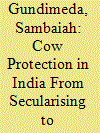

|
|
|
|
|
| Summary/Abstract |
Cow protection, a potent tool in the hands of cow vigilantes for atrocities against Muslims and Dalits, has become a heavily politicised issue in contemporary India. Its roots, connecting the themes of caste-Hindu religious sentiment, communalism and economic reasoning, can be traced to the late nineteenth century, though basic problems over the intriguingly complex use of cattle are clearly much older. This article relates contemporary cow protection debates specifically to Arya Samaj arguments against cow slaughter in the late nineteenth century and publication of a special issue of the journal Kalyan, titled Gau Ank, in 1945. The discussion shows how cow protection debates in the Constituent Assembly of India and in subsequent post-independence judicial verdicts were heavily influenced by these two earlier discourses. Analysing two landmark judicial decisions on cow slaughter, the article argues further that recent judicial endorsement of cow protection legitimises Hindu majoritarian sentiments in the law, while depriving millions of Indians, not just Muslims, of fundamental rights to food and livelihood. The conclusion attempts to consider some possible solutions to the current impasse.
|
|
|
|
|
|
|
|
|
|
|
|
|
|
|
|
| 10 |
ID:
165932
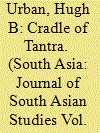

|
|
|
|
|
| Summary/Abstract |
This article examines the modern transformations of the temple of the goddess, Kāmākhyā, and her most important festival, Ambuvācī Melā, in Assam. Since at least the eighth century, Kāmākhyā has been revered as one of the most important ‘seats of power’ or centres of the goddess that dot the landscape of South Asia. However, during the last century, this temple and its festivals have undergone a series of profound transformations—first, in the context of Hindu nationalism and attempts to imagine a unified sacred landscape of ‘Mother India’, and second, in the context of spiritual tourism and efforts to develop the Northeast region as a new economic powerhouse for the twenty-first century.
|
|
|
|
|
|
|
|
|
|
|
|
|
|
|
|
| 11 |
ID:
071478
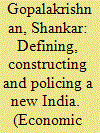

|
|
|
| 12 |
ID:
162868


|
|
|
| 13 |
ID:
142837
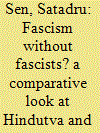

|
|
|
|
|
| Summary/Abstract |
This essay examines some aspects of Hindutva and Zionism, taking a comparative approach that underlines the ubiquity—i.e. the comparability—of fascisms in the articulation of modernity. It focuses on the imaginary of race, place and peoplehood in each ideology, the roles of majorities and minorities in the formulation of national well-being, and possible exit strategies from violently exclusivist statecraft. It explores, also, an intellectual prehistory in which Indian nationalists cultivated a fascination with Jews and Zionism as part of their understanding of a race constituted by historical damage and the imperative of repair. It argues, first, that the comparative study of fascisms is not only valid, but necessary to the politics of democracy. Second, it argues that because Indian fascism is less racialised than the Israeli version, it is more open to contestation and mitigation by the deployment of alternative imaginaries of ethnicity and nationhood.
|
|
|
|
|
|
|
|
|
|
|
|
|
|
|
|
| 14 |
ID:
154551
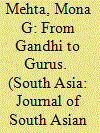

|
|
|
|
|
| Summary/Abstract |
This article compares the public sphere of gurus (‘guru-sphere’) in contemporary Gujarat and that of Gandhi historically as important sites of political contestation. It argues that despite their common use of religious idioms to convey political ideas, Gandhi and the gurus authorise radically different political projects with divergent conceptions of the Hindu subject and Indian polity. The discursive activities of the guru-sphere have helped forge a dominant consensus that endorses Hindutva politics. Operating within a democratic civil society and borrowing from Gandhian idioms, gurus have actively challenged key constitutional values derived from the Gandhian public sphere. The study reveals the paradoxical tendency of Gujarat's public sphere to produce hegemonic monologues over pluralistic dialogues, not in the absence of, but through the institutional mechanisms of, deliberative democracy.
|
|
|
|
|
|
|
|
|
|
|
|
|
|
|
|
| 15 |
ID:
108994
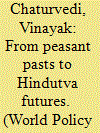

|
|
|
|
|
| Publication |
2011.
|
| Summary/Abstract |
This paper considers the participation and initiation of communities once classified as criminal tribes in the violence in Gujarat in 2002. Given that their descendants continue to suffer politically and economically in post-colonial India, it is necessary to examine the role of the marginalised and subordinate communities in the making of Hindutva in the twenty-first century. Building upon debates on violence in post-colonial societies, the paper examines the historical contexts for why victims often become killers in genocide. More specifically, it provides an analysis of one specific community of poor, low-caste peasants, the Dharalas, who participated in the violence against Muslims in Gujarat. The paper also examines the limits of historical methodology for the writing of histories of violence from 'below'.
|
|
|
|
|
|
|
|
|
|
|
|
|
|
|
|
| 16 |
ID:
104841
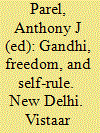

|
|
|
|
|
| Publication |
New Delhi, Vistaar Publications, 2000.
|
| Description |
ix, 156p.
|
| Standard Number |
8178291886
|
|
|
|
|
|
|
|
|
|
|
|
Copies: C:1/I:0,R:0,Q:0
Circulation
| Accession# | Call# | Current Location | Status | Policy | Location |
| 056118 | 954.035092/PAR 056118 | Main | On Shelf | General | |
|
|
|
|
| 17 |
ID:
047703
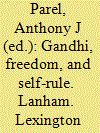

|
|
|
|
|
| Publication |
Lanham, Lexington Books, 2000.
|
| Description |
ix, 164p.hbk
|
| Standard Number |
0739101366
|
|
|
|
|
|
|
|
|
|
|
|
Copies: C:1/I:0,R:0,Q:0
Circulation
| Accession# | Call# | Current Location | Status | Policy | Location |
| 043750 | 954.035/PAR 043750 | Main | On Shelf | General | |
|
|
|
|
| 18 |
ID:
000533
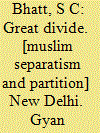

|
|
|
|
|
| Publication |
New Delhi, Gyan Publishing House, 1998.
|
| Description |
xii, 296p.hbk
|
| Standard Number |
8121205913
|
|
|
|
|
|
|
|
|
|
|
|
Copies: C:1/I:0,R:0,Q:0
Circulation
| Accession# | Call# | Current Location | Status | Policy | Location |
| 041917 | 954.0359/BHA 041917 | Main | On Shelf | General | |
|
|
|
|
| 19 |
ID:
122429
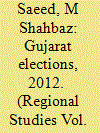

|
|
|
| 20 |
ID:
108987
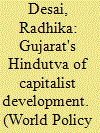

|
|
|
|
|
| Publication |
2011.
|
| Summary/Abstract |
Commentators contemplating the hold of Hindutva in Gujarat swing between anxiously wondering whether it shows where the rest of the country is headed and complacent insistence that it is exceptional. Against the background of a wider understanding of the main drivers of Hindutva, and the pattern of its differential advance in the States and regions of India, this paper argues that the hold of Hindutva in Gujarat can be explained by a combination of three factors: aspects of its inherited caste and class structure; the levels and patterns of capitalist development; and the patterns of social polarisation their combination has produced. Given the historic fragmentation of its upper castes, Gujarat's specificity in providing exceptionally fertile ground for the growth and stabilisation of Hindutva can be attributed to the fast pace of its capitalist development and consequently fast economic advance of its middle castes and their social and political assimilation into the formerly Savarna ruling bloc through Hindutva. Given that the differences of inherited social structure and culture are differences of degree and not quality, and that capitalist and neo-liberal development is not questioned, indeed is zealously pursued everywhere in India, and given that social polarisation is considered an acceptable cost of development, Gujarat could well be the image of India's future.
|
|
|
|
|
|
|
|
|
|
|
|
|
|
|
|
|
|
|
|
|